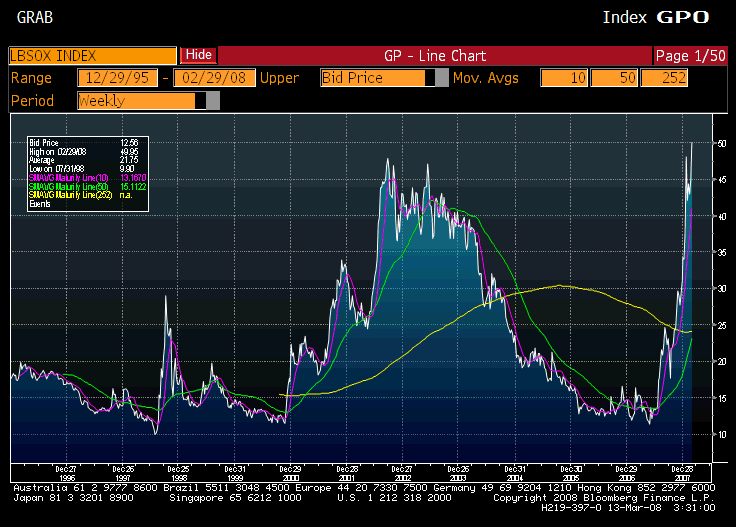Thinking About the Bear Stearns Bailout
When I go to prayer meeting on Thursday evenings, I have recently begun requesting prayer for the economy and policymakers.? Ordinarily, I resist doing that, because it usually doesn’t sound right.? I remember one time two years ago explaining why we should pray about a given economic issue, and my dear wife said, “Let me get this straight.? We’re praying for the World Economy, that we don’t have a disaster?”? But when I was asked to explain my concern recently, I said, “Things are breaking in the financial system that no one a year ago would expect to break, and the costs could be high.? A second Great Depression is not impossible, and a repeat of something similar to the 70’s is more likely, minus the ugly clothes.”? That said, I am satisfied with praying for my daily bread, and the daily bread of others.
I didn’t expect to start the post this way, but that’s what’s on my heart.? Things are breaking that should not break, but what is happening is consistent with what I have been writing about here and at RealMoney for the past four years.? I am not a bear by nature, nor a bull.? I just try to analyze economic situations from a holistic perspective, and what I have seen over the past four years, was a massive increase in leverage that was not sustainable.? This affected the investment banks as well, and in this case, Bear Stearns in particular.
Confidence is tricky.? The investment banks are more highly levered than mortgage REITs, and we have seen the fallout there, even though real estate is more stable than the assets financed by most investment banks.
This is why in investing, I write about having a provision for adverse deviation, or in Ben Graham’s terms, “A margin of safety.”? With leverage, one should always calculate the maximum amount of? leverage consistent with prudence, and then take several steps back from there.? What is permissible in the boom phase has little relevance to the bust phase.
Now, I tell my children, “Don’t blame the Ump.”? In sports, if it is call of an umpire or referee that is the difference between victory and defeat, then you did not deserve to win.? You did not gain a commanding lead in the contest.? In this situation, Bear Stearns played close enough to the edge that rumors could begin to push at their short-term financing base, creating a crisis.? Investment banks must be like Caesar’s wife — there can’t be a hint of impropriety (with respect to financing).
Now, with a downgrade in credit ratings, Bear Stearns will have to find a buyer.? Why?? Major financial companies that lend have to have A-1/P-1 commercial paper ratings in order to make money.? The ability to borrow at cheap rates in the short run is important to profitability.
Naked Capitalism has some good points on this topic.? I would echo on the mortgage exposure.? More important is not being liked.? According to friends of mine, Lehman got rescued privately during the LTCM crisis because they convinced creditors to support them.? Bear walked out on the LTCM bailout, and it still leaves a bad taste in the mouth of Wall Street.? Wall Street does have honor, in a twisted way.? They remember who were their friends during tough times.? Bear was not one of them.
When there is a lot of worry around, it doesn’t take much to kick a marginal firm over the edge.? Bear had ample opportunity to move to lower level of leverage, and did not do it.? Now let’s talk about the rescuer.
The Omnipotent Federal Reserve
The Fed can’t run out of bullets, because it can always print money.? That comes with an inflation price tag attached, though.? In this case, they are providing funds freely to J. P. Morgan to the extent that they lend to Bear Stearns.? Now, I know why the Fed did this.? Bear Stearns my be small in a market capitalization sense, but is large when one considers all of the debts that they have, both in the cash and synthetic markets.? (As an aside, I was analyzing some muni bonds of a major issuer today, and it amazed me that Bear Stearns was their #2 counterparty.)
Now the Fed has Fed funds, the discount window, TAF, TSLF, and more.? I am not here to fault them for lack of creativity.? I am here to fault them for (like Bear Stearns) overtaxing their balance sheet.? There is only so much that the Fed can rescue before it chokes, because they (at that point) have no more safe assets to pledge.
I sold my capital markets exposure earlier this week, and I am glad that I did, late as that was.? The Fed is not big enough to rescue all of the investment banks, nor could they rescue the GSEs, without creating significant price inflation.? What a mess.? Avoid the depositary financials, and those that lend and intermediate aggressively.? This is not a time to be a hero in financials.


 For most of my readers, this book may prove to be too basic, but we all have friends that are not “money people.” They don’t know how to take care of their finances, and they constantly get into money troubles. This book could be of help to them.
For most of my readers, this book may prove to be too basic, but we all have friends that are not “money people.” They don’t know how to take care of their finances, and they constantly get into money troubles. This book could be of help to them.